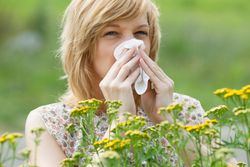What Individuals With Asthma & Allergies Should Know About COVID-19

Over the past few months, the coronavirus has gone from a blip on the radar to a global concern. Because shortness of breath is a major symptom of COVID-19, those with pre-existing respiratory conditions like asthma and pollen allergies may be more heavily impacted if they contract the virus. To combat anxiety and help you understand the virus’s effects, read this guide on what those with respiratory conditions should know.
Coronavirus or Asthma Flare-Up?
Because the virus reached pandemic level right as the seasons were shifting, many people are dealing with seasonal allergies. Even though you’ve dealt with allergies or asthma for years, a symptom flare-up during these times can leave you anxious it might be more. While these conditions all share some symptoms, there are key points where coronavirus differs.
Coronavirus isn’t likely to trigger sneezing, while seasonal allergies and common colds often will. Congestion is also very rare in coronavirus cases, though it often accompanies seasonal irritation. COVID-19 may also lead to shortness of breath, which isn’t common with allergies unless you also have asthma.
isn’t likely to trigger sneezing, while seasonal allergies and common colds often will. Congestion is also very rare in coronavirus cases, though it often accompanies seasonal irritation. COVID-19 may also lead to shortness of breath, which isn’t common with allergies unless you also have asthma.
How to Approach the Coronavirus
Those with asthma and pollen allergies should continue taking their regular medications for controlling these conditions while also following precautions currently recommended for everyone. Stay home, but when you have to go out for groceries or other essential services, wear a mask and maintain at least six feet between yourself and others. Wash your hands frequently for at least 20 seconds and avoid touching your face to limit the chances of transmission.
As an understanding of the virus increases, the recommended guidelines may change; check the CDC and WHO websites for the most up-to-date information.
If you deal with asthma or pollen allergies, find relief by visiting Allergy and Asthma Specialty Center/Masood Ahmad, M.D. in West Chester, OH. For over 25 years, he’s helped children and adults diagnose and treat a wide range of allergies. To learn more about his practice, visit the website. Call (513) 777-7097 with questions about allergies.
About the Business
Have a question? Ask the experts!
Send your question

